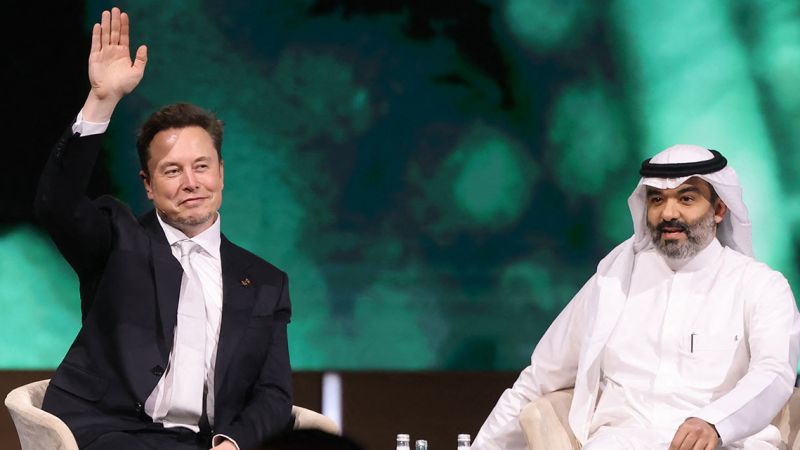Elon Musk’s ongoing relationship with the Trump administration’s Department of Government Efficiency continues to make headlines, especially as he steps back from some of his direct involvement. The intriguing connection between this billionaire entrepreneur and the sitting U.S. president has substantial implications for Musk’s various enterprises, which seem to prosper under this unique dynamic. His prominence, particularly at global gatherings, underscores the significant influence he wields on the international stage.
One striking example of this influence was recently observed at the Saudi-US Investment Forum held in Saudi Arabia. Here, Musk was prominently featured among other tech luminaries, including Jensen Huang, CEO of Nvidia, and Sam Altman, CEO of OpenAI. This high-profile event showcased the collaboration between Silicon Valley’s innovation giants and Saudi Arabian business officials, revealing a growing interest in technology investments from the Gulf state.
Musk’s role at this forum was pivotal, as he was the speaker slated to appear just before both President Donald Trump and Saudi Crown Prince Mohammed Bin Salman delivered their much-anticipated remarks. Engaging in dialogue with Saudi Communications and Information Minister Abdullah Alswaha, Musk announced several new business deals with the Saudi government. His grateful acknowledgment to the kingdom for approving Starlink for maritime and aviation use highlighted the global reach of his satellite internet service.
Furthermore, Alswaha hinted at the potential introduction of Tesla’s robotaxis to the Saudi market, signaling a promising future for Musk’s electric vehicle company in the region, especially after its recent launch in April. In true entrepreneurial fashion, Musk did not miss an opportunity to promote his other ventures, including The Boring Company and xAI, suggesting a robust roadmap for his interests in Saudi Arabia.
Musk’s strategic moves in Saudi Arabia are indicative of how his close ties to Trump have elevated his businesses onto a more significant global platform. Long before Trump’s presidency, Musk’s enterprises, particularly SpaceX, had already benefited greatly from various government contracts, reflecting his engagement with the political landscape.
Despite the potentially beneficial consequences of Musk’s dealings, both SpaceX and Tesla have yet to respond to inquiries about the specifics of his discussions in Saudi Arabia. However, there have been various examples of how the administration has actively supported Musk’s interests. For instance, amidst protests and vandalism aimed at Tesla earlier this year, Trump staged a public display of support for Musk’s company at the White House, showcasing not only enthusiasm for Tesla’s innovations but also an intention to protect them by threatening serious legal consequences for any vandals.
Additionally, reports from various media outlets, including The Washington Post, have indicated that countries under U.S. tariffs have been inclined to pursue Starlink agreements, possibly seeing them as a method to cultivate favorable relations with the Trump administration. Notably, Lesotho’s intentions to authorize Starlink licensing showcases an example of this trend, where gaining favor with American businesses appears to be a strategic focus.
Moreover, the legal landscape around Musk’s companies appears to have shifted positively since Trump’s inauguration. Investigations that could have posed challenges, such as a case involving SpaceX with the Department of Justice, have reportedly diminished. Evidence suggests that increased federal spending may also yield benefits for SpaceX while Musk’s Boring Company is reportedly engaging in discussions with the government regarding collaboration on significant infrastructure projects, like those related to Amtrak.
Apart from his ventures in the space and automotive realms, Musk’s acquisition of X—formerly Twitter—in 2022 for a staggering $44 billion has proven to be another venture impacted by his relationship with Trump. Following a surge in hate speech on the platform after Musk took charge, many advertisers left. Nonetheless, X has become a key communication hub for the Trump administration, symbolizing the profound intertwining of Musk’s business interests and political dynamics in Washington.
As Musk proclaims his intent to continue aiding in the dynamics of the digital currency market and actively engaging with political affairs in Washington, it stands to reason that the advantages for his various companies will likely persist for as long as Trump maintains power. Given these interconnected developments, the coming years may be transformative for Musk as he navigates the intersection of technology and political influence.



